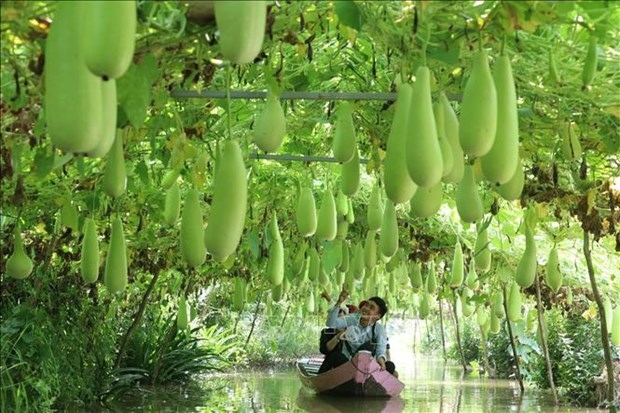Agritourism to become integrated economic sector: Minister
Minister of Agriculture and Rural Development Le Minh Hoan on March 15 said that agritourism should be turned into an integrated economic sector with agricultural products and typical characteristics of rural areas being used as resources to serve the tourism industry.

Speaking at a teleconference on tourism, Hoan noted that the National Strategy for Sustainable Agriculture and Rural Development for the 2021-2030 period, with a vision to 2050, already approved by the Prime Minister, affirms that rural tourism development is identified as one of the fundamental solutions, a driving force for promoting sustainable new-style rural areas, contributing to bringing into play the advantages and distinctive values of agriculture, rural areas, and farmers.
At the same time, the development of new-style rural areas is the foundation to support and create favourable conditions for the diversified and sustainable development of agritourism. The National Target Programme on building new-style rural areas for the period of 2021-2025 has also added components to the development of agritourism.
Hoan said over the past time, agritourism has recorded strong growth, bringing new “fresh air” and vitality to rural areas.
Preliminary statistics showed that Vietnam currently has about 500 agritourism and rural tourism models.
Thanks to the models, people in remote areas become more confident and active, many villages got prosperous and values of agricultural products as well as One Commune One Product (OCOP) products have increased thanks to tourism businesses.
Rice fields, terraced fields, orchards, rivers, streams, ponds, lakes, and fishing villages are all connected to unique destinations on the visitors’ journey of experience. Knowledge, indigenous culture, folk cuisine, and traditional rituals are awakened thanks to tourism.
Agritourism does not only brings higher incomes to people, and economic benefits to localities, but also creates other intangible values that help popularise images of Vietnam's agriculture, and promote agricultural products right at the farms.
Agritourism also introduces and promotes images of Vietnam’s rural areas with diverse cultural identities and hospitable rural people. It also helps increase community connectivity, calling for jointly building green, clean, and beautiful countrysides and preserving its values.
However, Hoan said agritourism still faces difficulties as many localities have not yet seen the potential of this type of tourism and paid insufficient attention.
Many models were developed spontaneously, without making differences, he said, adding that supporting mechanisms and policies have not yet become the driving force to develop a tourism industry that brings both economic and social values.
Hoan said that it’s time to change the attitude towards the importance and values of agritourism so that it can become a part of the tourism industry.
He suggested the Ministry of Culture, Sports and Tourism consider adding agritourism to the National Tourism Programme to promote and enrich tourism resources.
Agritourism must be developed in a sustainable, inclusive, and multi-valued way. It effectively makes use of and promotes traditional values, production and farming practices, agricultural activities, and the typical ecological environment, associated with digital transformation. The community should be placed at the centre when developing tourism products, according to the minister.
It is necessary to strengthen the connection in agritourism, and form high-quality, diversified, and attractive tours and routes, he added.

